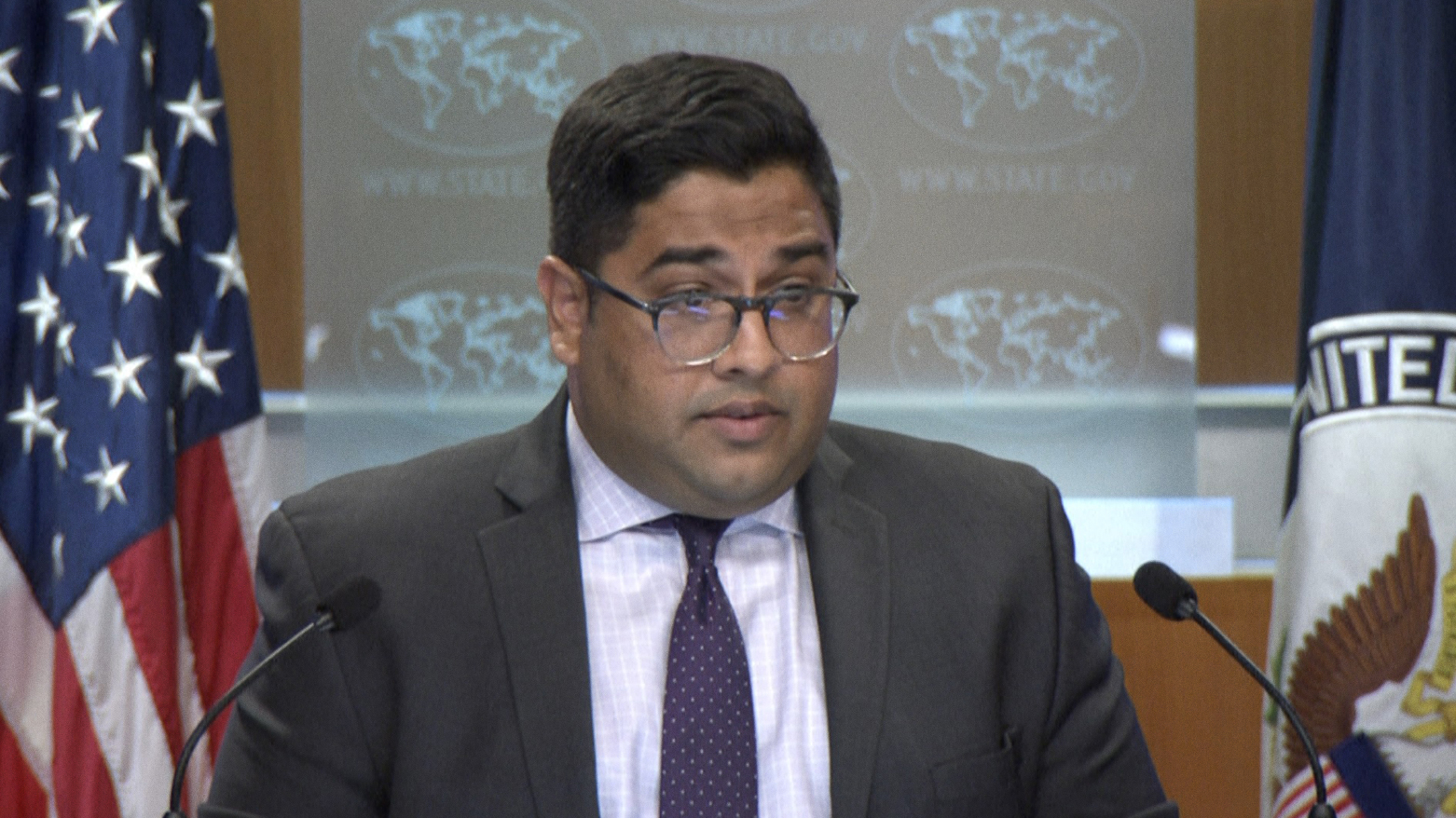US Works with Iraqi Gov’t; Expects it to Prevent Militia Attacks on US Targets
We "fully intend to work closely with our partners in Iraq," who have said they will hold accountable groups that target Americans.

WASHINGTON DC, United States (Kurdistan 24) – Pro-Iranian militias, which style themselves as the “Islamic Resistance of Iraq,” have threatened U.S. interests in the region, if Israel responds to the attacks from Hizbollah, which is based in southern Lebanon, with a major assault on that country.
In making that threat, the militias in Iraq were simply repeating the language of their principle backer, that is Iran, and the threats that Tehran had issued shortly before.
The quick repetition of the threats against the U.S. by the Iranian-backed militias in Iraq add to the suspicion that Iran is orchestrating the conflict.
Iraqi Militias Echo Iranian Threat
“U.S. interests in Iraq and the region will be a legitimate target for the resistance fighters,” Iraq’s “Islamic Resistance” threatened on Sunday.
"Following Israeli and US threats to launch a widespread war against Lebanon, the Iraqi Resistance has decided that if Israel implements the threat, they will immediately launch their operations," the statement said, as it warned, "US interests in Iraq and the region will be a legitimate target for the resistance fighters."
Read More: Radical Iraqi militia threatens to expand operations amid Israeli-Lebanese tensions
Of course, the U.S. has not threatened any such thing. Rather, it is U.S. policy to contain the conflict between Israel and Hamas to the Gaza theater. It is Iran, and the militias that it backs, which seek to expand the conflict.
Indeed, the statement of Iraq’s Islamic Resistance militias was pretty much an echo of an earlier statement issued by Iran itself.
On Friday, the UN mission of the Islamic Republic published a fiery statement warning Israel against “full-scale aggression” in Lebanon, saying that would lead to an “obliterating war.”
“‘All options, [including] the full involvement of all Resistance Fronts, are on the table,’” Iran’s UN mission tweeted late on Friday, as al-Jazeera reported. It also explained that “Resistance Fronts” refers to “Iran-aligned armed groups across the region.”
U.S. Response
At Monday’s State Department briefing, Kurdistan 24 asked about the threat issued by Iraq’s so-called “Islamic Resistance.”
The answer began with a correction of the falsehood promulgated by the Islamic Resistance in its threat, as the Deputy Spokesperson, Vedant Patel, disputed any claim that the U.S. was seeking to expand the conflict into Lebanon.
“Since October 7th,” Patel stated, referring to the day on which Hamas launched its brutal cross-border assault into Israel, triggering the current conflict, “the United States has prioritized de-escalation and ensuring that this conflict doesn’t spread” and “that continues to be the case.”
“When it comes to Iraq,” he continued, “we expect and fully intend to work closely with our partners” there, and “this is something that {Prime Minister] Sudani and other leaders across the Government of Iraq have also made clear, that they would intend to hold interests or groups that choose to target American interests accountable.”
“And that’s something that we’ll continue to push for as well,” Patel concluded.
Iranian Influence in Iraq
The problem, almost certainly, is not Iraqi Prime Minister Mohammed Shia al-Sudani, who assumed office in Oct. 2022, with Kurdish support, after a year-long deadlock following the 2021 parliamentary elections.
The problem is the influence that Iran has established within Iraqi political circles. Under President George W. Bush, who launched the 2003 war that overthrew Saddam Hussein and his regime, the U,S. worked actively to counter Tehran’s efforts to establish and broaden its influence in Iraq.
But that was not the case, once Barack Obama became president in 2009. The Bush administration, believing that the Iraq war would be easy, did a poor job of explaining why that war was necessary.
As a senator, Obama had opposed it. Indeed, the war turned out to be a substantial conflict, and not the “cakewalk” that some had predicted. So Obama worried that some later Republican administration might launch an equally foolish—in his view—war to overthrow the Iranian regime (which Bush had labeled as part of the “axis of evil,” along with Iraq and North Korea.)
Thus, Obama sought to better U.S. ties with Iran, so as to preclude any such military action, as had occurred in Iraq. That effort included the 2015 nuclear deal, while the Obama administration also turned a blind eye to Iran’s growing influence in Iraq, including Tehran’s increasing support for Shi’ite militias.
As a long-time Senator and Chair of the Senate Foreign Relations Committee, Joe Biden had supported Operation Iraqi Freedom (OIF.) Indeed, in that capacity, as a Senate leader, he was sent to Erbil in advance of the war’s start to help prepare the Kurdish leadership for the coming conflict.
So the Biden administration has maintained a commitment to Iraq. It is reflected, above all, by its policy of continuing the fight against ISIS in Iraq and in Syria.
Indeed, the Pentagon confirmed that policy just last month.
Read More: US: We’ll ‘Continue to Work Closely’ with Iraq Forces, Peshmerga to Ensure ‘Enduring Defeat of ISIS’
However, several of Biden’s advisors served in the Obama administration, and aspects of Obama’s conciliatory policy toward Iran have continued. Initially, that included an effort, now dropped, to revive the nuclear deal, and it has included, at least so far, a reluctance to call out pro-Iranian elements within the Iraqi government.
However, that may be changing. In recent testimony before the Senate Foreign Relations Committee, Amb. Tracy Jacobson, whom Biden has nominated to be the next U.S. ambassador to Iraq, stated that the pro-Iranian militias—that is Iraq’s so-called “Islamic Resistance”—constitute the “primary threat” to the country.